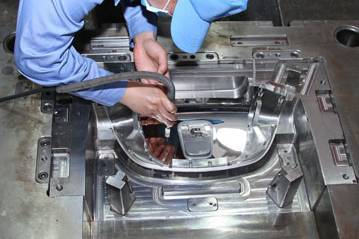
The Polishing Process of Plastic Injection Molds: A Key to Superior Quality
In the realm of plastic injection molding, the final quality of your product often hinges on the meticulous attention given to the mold. For producing those parts with highly shiny surface effect, one of the most critical steps in ensuring that your plastic parts meet the highest standards is the polishing process of the mold. This essential step not only enhances the appearance of the final product but also significantly impacts its functionality and performance. Let’s explore why the polishing process is so vital and how it is carried out to achieve outstanding results.
Why Polishing Matters
Polishing is more than just a cosmetic step; it plays a crucial role in the performance and longevity of the mold and the quality of the molded parts. Here’s why:
- Surface Finish: A polished mold surface ensures that the final product has a smooth, flawless finish. This is especially important for consumer-facing products where appearance can significantly affect customer satisfaction.
- Dimensional Accuracy: A smooth surface reduces the likelihood of defects such as surface blemishes, sink marks, and texture inconsistencies, leading to better dimensional accuracy and consistency in the final product.
- Efficient Production: Polished molds offer reduced friction and improved flow of molten plastic, which enhances the overall efficiency of the injection molding process. This can result in fewer defects and a more streamlined production cycle.
- Extended Mold Life: Proper polishing minimizes wear and tear on the mold, extending its operational life and reducing maintenance costs.
Steps in the Polishing Process
The polishing process involves several stages, each designed to refine the mold’s surface and prepare it for high-quality production. Here’s a closer look at these steps:
- Initial Surface Preparation
- Deburring: The first step in polishing is to remove any burrs or sharp edges left from the machining process. Deburring ensures a clean surface, free from obstructions that could affect the quality of the molded parts.
- Sanding: Coarse sanding is performed to eliminate larger surface irregularities. This stage helps level the surface and provides a consistent base for finer polishing steps.
- Fine Polishing
- Grinding: Following initial sanding, fine grinding is used to further smooth the surface. This step employs finer abrasives to remove any remaining scratches and create a more refined surface.
- Buffing: Buffing uses polishing compounds and rotating pads to achieve a high-gloss finish. This process enhances the surface’s reflectivity and smoothness, giving the mold its final polished appearance.
- Final Polishing and Inspection
- Ultrafine Polishing: For molds that require an exceptionally smooth finish, ultrafine polishing techniques are used. This involves very fine abrasives or diamond pastes to achieve a mirror-like surface.
- Inspection: The final stage involves a thorough inspection to ensure that the mold meets the required specifications. Any remaining imperfections are addressed to ensure that the mold is ready for production.
The Batnon Difference
At Batnon, we understand the importance of the polishing process in achieving superior mold performance and product quality. Our dedicated team employs advanced polishing techniques and stringent quality control measures to ensure that every mold meets our high standards. By investing in meticulous polishing, we help you achieve:
- Exceptional Surface Finish: Our attention to detail ensures that your molded parts have a smooth, flawless appearance.
- Optimal Performance: Polished molds contribute to efficient production and reduced defects, enhancing the overall effectiveness of your manufacturing process.
- Long-Term Value: Properly polished molds last longer, reducing maintenance costs and ensuring consistent performance over time.
Conclusion
For plastic parts that require highly shiny finish, the polishing process is a vital component of plastic injection molding that directly influences the quality, performance, and longevity of your products. By focusing on precise polishing techniques, Batnon ensures that your molds are ready to deliver exceptional results. If you’re looking to enhance your plastic injection molding projects, contact us today to learn more about our polishing process and how we can help you achieve outstanding quality and performance.
Visit our website or reach out to our team to discuss your needs and discover how Batnon can support your next project.
